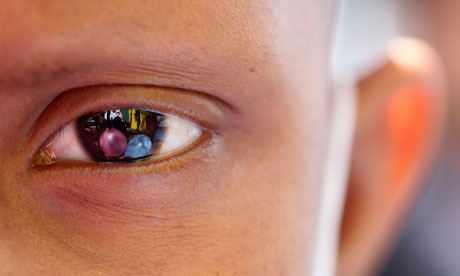Knowing whether to say 'how are you?' or mention 'bravery' is one problem, another is our society in which death is a taboo

'If you ask someone with cancer how she or he is, do be prepared to listen to the answer.' Photograph: Ali Jarekji/Reuters
Among cancer sufferers there's often a shared moan about how some friends or acquaintances "just don't get it", how some turn away and retreat, and some meddle and proselytise.
Cancer sufferers all have their own pet grievances and I wouldn't claim to speak for others. In fact, recognising the infinite variety of individual responses to cancer is a necessary part of having, handling and treating cancer. To revise Tolstoy, all healthy people are alike, all unhealthy people are unhealthy after their own fashion. We are all variants from a norm; that's why we're being treated.
So there are no uniform rules of the game when it comes to talking to friends or acquaintances who have cancer about their condition.
Take "you're looking well" or variants thereof. Sometimes people do get a boost from such remarks, or are at least relieved to know that they don't look as bad as they feel. But for me there's always a disconnection: if I really do look well (and I suspect that's mainly because I don't look as bad as people expect or fear), then my appearance belies reality. I'm not well. I'm ill. And there are times when "you look well" feels like a denial, and places you in the awkward position of having to deny the denial (and say you may look well but feel like shit) or to go along, keep up the pretence, and thereby suppress an underlying, insistent truth.
Some people feel buoyed when people compliment their "bravery". Others, including me, find the bravery rhetoric around cancer deeply misconceived. It shifts responsibility on to the patient; if you succumb to your cancer, or even if you just complain about it, are you wanting in "bravery"? When someone tells me I've been "brave" I don't know what to make of it. There's no choice in the matter. This is a front line it's impossible to flee from.
Then there's "how are you?", a casual enquiry, in practice little more than a salutation, that acquires all kinds of challenges for the person with cancer. How do you answer? What does the person asking really want to know? How earnest is the question? Responses vary according to mood and context. Sometimes, I simply say "OK" – either because at that moment I can't muster the energy required to give a meaningful answer or because I'm unsure whether the inquirer really wants to hear that answer. Sometimes, when I do attempt to give a candid reply, I sense the inquirer shrinking way, uncertain how to respond, how to handle this discourse of pain and mortality.
While I don't think there can be a protocol to govern this kind of dialogue, I would say that if you ask someone with cancer how she or he is, do be prepared to listen to the answer. And remember that listening to it is nowhere near as uncomfortable as living with it.
Before I was diagnosed with multiple myeloma, and began my own journey through the labyrinth of cancer, I was as insensitive as anyone to these issues. So I know this question – how we talk about cancer – is not about individual foibles. It's not about making people feel guilty. The situation, for both parties, is impossible: a convergence of reticence and disquiet, closeness and distance, helplessness and the desire to help. The conventions of everyday language are stretched to breaking point.
But while some of our difficulties in engaging in this kind of dialogue may be rooted in the human condition, I've also been asking myself how much of it is peculiar to our own society. Surrounded by commercial displays of young, trim, blemish-free bodies, it's easy to feel marginalised. Our culture enjoins celebration and affirmation; huge efforts go into the manufacturing of "feel-good" moments, one succeeded rapidly by another. The affirmative act becomes a social duty, a gesture that we, the ill, are expected to make, and for which we are congratulated.
Sure, even for the severely ill, there's plenty to affirm in life – wondrous works of art, sublime acts of rebellion, love and friendship – but life is also arbitrarily cruel, and it's an additional cruelty to ask people to deny that reality.
A society that vaunts individual success, where nothing is disdained so much as a "loser", does not quite know what to do with the ill or disabled. Unless our suffering can be sentimentally packaged, or recast as part of the neoliberal cult of "can do, will do", it remains unrepresented. The consumerist regime generates a perpetual present, in which life is a succession of satisfied desires, without links to past or future. Terminal illness cannot be accommodated within that framework.
We lack the ritual and social contextualisation of death found in pre-modern societies, and while there's no going back to that, an honest, self-aware, humane society must find ways and means of integrating death and suffering into its everyday norms.

No comments:
Post a Comment